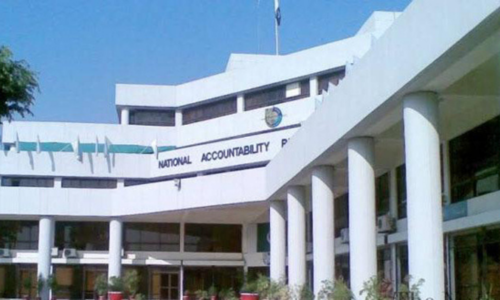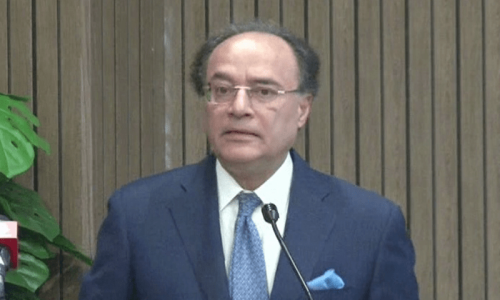ISLAMABAD: Amending the National Accountability Ordinance (NAO) for a third time in less than a month, the federal government has stripped the Supreme Judicial Council (SJC) of the powers to remove the National Accountability Bureau (NAB) chairman and authorised the president to do so.
The National Accountability (Third Amendment) Ordinance 2021 promulgated on October 31 has come into force at once and the amendments have been deemed to take effect from October 6 when the second amendment was promulgated.
“The reason to bring amendments to the ordinance was to provide clarity as after the second amendment a number of provisions were being misinterpreted by different quarters,” Law Minister Barrister Dr Farogh Naseem said while talking to Dawn.
The amendments were brought to the ordinance after seeking approval from Prime Minister Imran Khan during a meeting held on October 27. It was attended by Minister for Planning and Development Asad Umar, Information Minister Fawad Chaudhry, Human Rights Minister Dr Shireen Mazari, Defence Minister Pervez Khattak, Adviser to the Prime Minister on Accountability Mirza Shahzad Akbar and the law minister.
Third amendment to NAO gives removal power to president; opposition terms move an attempt to usurp powers of judiciary
Attorney General for Pakistan (AGP) Khalid Jawed Khan did not attend the meeting because he was in Karachi then, though he had a different view on the law, emphasising that no person-specific law should be made and that the forum of removal should not be given to the executive.
“It seems that the other opinion, instead of the one taken by the AGP during earlier meetings, prevailed,” said a senior counsel on condition of anonymity, adding that the third amendment has also created a confusion since it is not clear whether the president will act on the advice of the prime minister for the removal of the NAB chairman if the removal procedure has been taken outside the purview of the SJC.
The most prominent change the government has made in the fresh ordinance is the procedure of removing NAB Chairman Javed Iqbal by amending Section 6 (b)(v). The provision suggests that the chairman will hold office for a period of four years on such terms and conditions as may be determined by the president and may be removed by the president on the grounds of removal of a judge of the Supreme Court.
In the second amendment, Section 6(b)(v) has suggested that the NAB chairman shall hold office for a period of four years on such terms and conditions as may be determined by the president and shall not be removed from office except on grounds provided for the removal of a judge of the Supreme Court in the manner and by the forum provided under the Supreme Judicial Council through Article 209 of the Constitution.
Farogh Naseem conceded that though the standard set by the SJC for removing a superior court judge would remain applicable in the present scenario under the third amendment, the forum in this regard would be the president, and not the SJC.
On July 12, a meeting of the SJC had deferred further deliberations on a reference until the federal government came up with a solution to a legal lacuna: can the council remove the NAB chairman?
The SJC meeting, presided over by Chief Justice of Pakistan (CJP) Gulzar Ahmed, had taken up a 2019 reference moved by Advocate Chaudhry Muhammad Saeed Zafar against the NAB chairman against the backdrop of a leaked video clip showing alleged clandestine and illicit relationship between Javed Iqbal and Tayyaba Gull, an accused in an inquiry being conducted by NAB.
Under the laws, the SJC can initiate proceedings against judges of the superior courts, the Auditor General of Pakistan and the Federal Ombudsman, but the original NAO was silent on providing any forum for removal of the NAB chairman.
The third amendment also suggests that all proceedings, including inquiries, investigations, references or trials, commenced under this ordinance prior to October 6 in relation to an offence under the Anti-Money Laundering Act 2010 will be dealt with in accordance with the ordinance. Moreover, in relation to any proceeding, including reference or trial, the courts under the ordinance will have the jurisdiction to enforce the Anti-Money Laundering Act.
Likewise, an amendment has been made to Section 16 of the ordinance which clarifies that until the installation of electronic facilities, the manner of recording evidence already in place will continue; besides, if any technical or other reasons prevent the recording of the evidence electronically, the evidence will be recorded according to the procedure prior to the installation of electronic facilities.
In this regard, the law ministry had also issued a clarification on October 18 in a letter advising all the administrative judges of accountability courts that the accountability judges should continue recording the evidence in vogue prior to the third amendment until the installation of the electronic facilities comes into force.
The purpose of issuing the clarification was that the installation of appropriate facilities for recording the evidence electronically was not immediate. Besides, in a 2002 judgement, the Supreme Court had held that the court, in the absence of the procedure to record evidence, might regulate its own procedure in a manner that no prejudice was caused to either party, the letter had stated.
Opposition parties’ reaction
The country’s two major opposition parties — the Pakistan Muslim League-Nawaz (PML-N) and the Pakistan Peoples Party (PPP) — expressed concern over the third amendment to the National Accountability Ordinance and termed the government’s move an attempt to usurp the powers of the judiciary and bring NAB under the direct control of the prime minister.
“No doubt that the incumbent NAB chairman should have been removed a long time ago for a variety of reasons. However, amending the law through an ordinance at this point of time to empower the president, instead of the SJC, to remove the NAB chairman smacks of mala fide,” PPP secretary general Farhatullah Babar said while talking to Dawn.
He said that under the Constitution, the president must act on the advice of the prime minister. Through this ordinance, the prime minister had actually empowered himself to sack the NAB chairman, he added.
“Something sinister seems to be going on. It is well known how NAB levers have been used for political engineering. It’s possible that the engineers might have concluded that it’s time to unleash NAB against Imran [Khan] and Imran trying to preempt it,” said Mr Babar.
PML-N senior vice president and former prime minister Shahid Khaqan Abbasi, when contacted, alleged that the government had brought this new ordinance with a mala fide intent in order to save the corrupts in the ranks of the present government. He also expressed his surprise over the government’s move to amend an ordinance which it had recently promulgated and which had not even been laid before parliament.
Mr Abbasi alleged that through this ordinance the government had “attacked” the judiciary and deprived it of its powers to remove the NAB chairman.
Published in Dawn, November 2nd, 2021














































